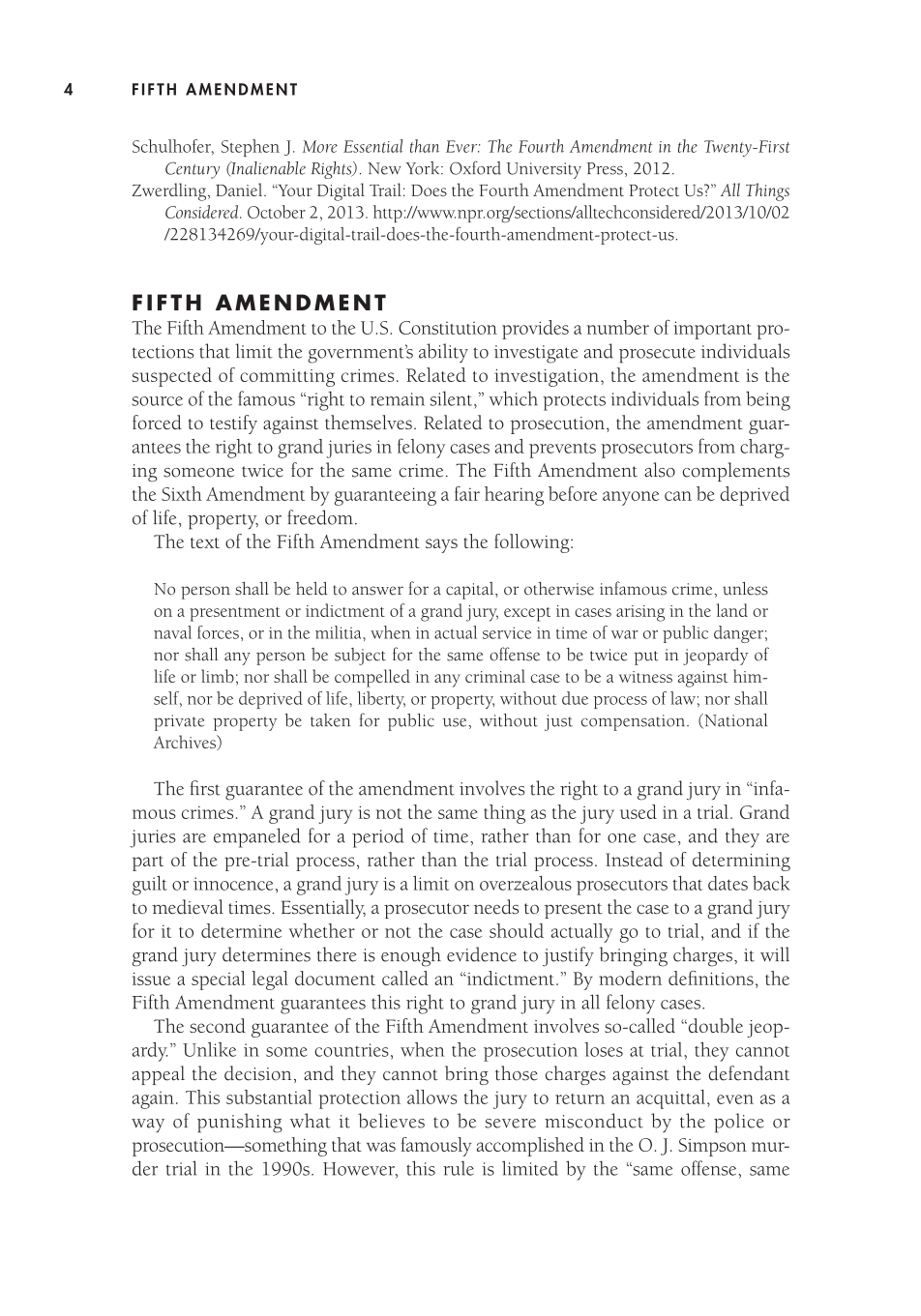FIFTH AMENDMENT 4
Schulhofer, Stephen J. More Essential than Ever: The Fourth Amendment in the Twenty-First
Century (Inalienable Rights). New York: Oxford University Press, 2012.
Zwerdling, Daniel. “Your Digital Trail: Does the Fourth Amendment Protect Us?” All Things
Considered. October 2, 2013. http://wwwnpr . . org / sections / alltechconsidered / 2013 / 10 / 02
/228134269/your-digital-trail-does-the-fourth-amendment-protect-us.
FIFTH AMENDMENT
The Fifth Amendment to the U.S. Constitution provides a number of important pro-
tections that limit the government’s ability to investigate and prosecute individuals
suspected of committing crimes. Related to investigation, the amendment is the
source of the famous “right to remain silent,” which protects individuals from being
forced to testify against themselves. Related to prosecution, the amendment guar-
antees the right to grand juries in felony cases and prevents prosecutors from charg-
ing someone twice for the same crime. The Fifth Amendment also complements
the Sixth Amendment by guaranteeing a fair hearing before anyone can be deprived
of life, property, or freedom.
The text of the Fifth Amendment says the following:
No person shall be held to answer for a capital, or otherwise infamous crime, unless
on a presentment or indictment of a grand jury, except in cases arising in the land or
naval forces, or in the militia, when in actual service in time of war or public danger;
nor shall any person be subject for the same offense to be twice put in jeopardy of
life or limb; nor shall be compelled in any criminal case to be a witness against him-
self, nor be deprived of life, liberty, or property, without due process of law; nor shall
private property be taken for public use, without just compensation. (National
Archives)
The first guarantee of the amendment involves the right to a grand jury in “infa-
mous crimes.” A grand jury is not the same thing as the jury used in a trial. Grand
juries are empaneled for a period of time, rather than for one case, and they are
part of the pre-trial process, rather than the trial process. Instead of determining
guilt or innocence, a grand jury is a limit on overzealous prosecutors that dates back
to medieval times. Essentially, a prosecutor needs to present the case to a grand jury
for it to determine whether or not the case should actually go to trial, and if the
grand jury determines there is enough evidence to justify bringing charges, it will
issue a special legal document called an “indictment.” By modern definitions, the
Fifth Amendment guarantees this right to grand jury in all felony cases.
The second guarantee of the Fifth Amendment involves so-called “double jeop-
ardy.” Unlike in some countries, when the prosecution loses at trial, they cannot
appeal the decision, and they cannot bring those charges against the defendant
again. This substantial protection allows the jury to return an acquittal, even as a
way of punishing what it believes to be severe misconduct by the police or
prosecution—something that was famously accomplished in the O. J. Simpson mur-
der trial in the 1990s. However, this rule is limited by the “same offense, same

































































































































































































































































































































































































